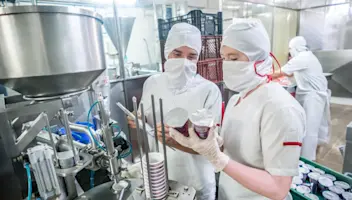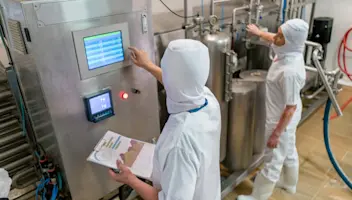Aptean’s Top Food Safety Blogs for World Food Safety Day 2023
Aptean’s Top Food Safety Blogs for World Food Safety Day 2023
Aptean’s Top Food Safety Blogs for World Food Safety Day 2023
7 Jun 2023
John McCurdy
A staggering 600 million people—or 7.5% of the world’s population—contract a foodborne illness each year, and sadly children under 5 years of age account for 40% of these cases. Given such distressing statistics, it only makes sense that we take one day each year to remember the importance of food safety and focus on educating industry professionals and consumers alike on the subject.
Originally introduced in 2018 by the United Nations General Assembly, World Food Safety Day has been embraced by the industry as an important reminder of the need to protect customers from adverse health outcomes. Now jointly facilitated by the Food and Agriculture Organization (FAO) of the UN and the World Health Organization (WHO), the annual observance is centered on a different theme each year, and “Food Standards Save Lives” is the key message for 2023.
Underpinned by science and designed to protect both consumers and manufacturers, standards have a direct impact on health. They also play a key role in improving food security—reliable access to affordable, nutritious food—as that cannot exist without food safety. And while remaining compliant with regulations can be challenging, it is always in the interest of public health and creating trust between companies and consumers.
To help you understand the key food safety issues and best practices, as well as how food enterprise resource planning (ERP) platforms enable businesses like yours to deploy an effective and comprehensive plan, we pulled together this list of our five top food safety blog posts from the past year. With one more general piece and others dedicated to distinct aspects of the topic, there should be something for everyone who works in this space.
Why You Need Food Safety ERP Functionality
Purpose-built features dedicated to promoting food safety are a critical component of any food ERP solution worth considering. Among the most important are those for facilitating compliance; tracking and isolating contaminants; segregating and properly labeling allergens; and preparing for and executing a product recall.
In this blog, we cover the ERP functionalities designed specifically for each of the above purposes and how they can help your business uphold even the most exacting food safety standards.
The FDA Food Traceability Final Rule: 7 Ways Aptean Food & Beverage ERP Helps Keep Your Business Compliant
In November 2022, the U.S. Federal Register published the FDA’s Requirements for Additional Traceability Records for Certain Foods, better known as the FDA Food Traceability Final Rule. While the official mandatory compliance date isn’t until July 2028, now is the time for food and beverage companies to prepare for enforcement by putting in place the right processes and technology.
That’s why we dedicated this post to a more in-depth explanation of the additional regulations, as well as a walkthrough of the seven features of Aptean Food & Beverage ERP that make meeting the new standards a simpler matter.
What It Takes to Be Fully Recall-Ready in the Food and Beverage Industry
No food and beverage organization wants to face the prospect of a product recall—after all, the average cost of executing one is $10 million, and that’s before we account for the lost potential business that comes with the resultant damage to a brand’s reputation. That said, sometimes these events simply can’t be predicted or avoided, which means that every company must be ready in the event one is necessary.
To help decision-makers like you understand what that takes and the role technology plays, we published this blog that dives deep on recalls and how to best prepare for them.
High-Pressure Processing of Food: Mitigating Risks Efficiently and Effectively as Part of a Cohesive Food Safety Plan
High-pressure processing is a method of preserving and sterilizing food through the application of extremely high pressure, thereby inactivating dangerous microorganisms and enzymes. Also known by the acronym HPP and the term “pascalization” after the inventor of the process, Blaise Pascal, it can be applied across a number of different product categories and has the additional benefit of extending shelf life.
We cover the science behind the technique and how it fits into a cohesive food safety plan in this post. Also covered are some general best practices, as well as the indispensability of technology on this front.
How to Excel in Allergen Management in the Food Industry
More than 220 million people around the world are affected by food allergies, and the consequences for an individual who comes into contact with a substance to which they are allergic ranges from mild discomfort to life-threatening anaphylactic shock. Those harsh facts should impress upon every food and beverage professional the crucial nature of airtight allergen management.
This blog explores the subject in depth, covering the most problematic foods, government regulations, critical control points (CCPs) and how an ERP for the food industry helps you track, trace, segregate and label allergenic ingredients in your products.
The Advantages of Working with a Proven Provider
Through serving food and beverage businesses with the solutions they need to tackle food safety, Aptean is committed to the goals of World Food Safety Day and the market at large. We keep our finger on the pulse of new developments—including additional standards as they are introduced—and design our systems to help our customers overcome their toughest challenges.
We’re able to tailor our food and beverage ERP to the unique needs of companies across a wide range of sub-verticals thanks in large part to the extensive industry experience of our team members, which they’ve developed over collective decades working in the space. Our dedicated professionals “speak your language” and understand what it takes to succeed in food safety, and they leverage that knowledge in the creation of purpose-built features.
Aptean Food & Beverage ERP also has the additional benefit of being available for deployment via the cloud on a Software as a Service (SaaS) model. Such setups afford companies greater flexibility, enhanced data protection, stronger cybersecurity and improved accessibility—the last of which can be crucial in the case of a food safety emergency that occurs outside normal hours.
Yet another perk of trusting us with your software needs is the opportunity to work with a single provider for all the solutions you need. Our complete ecosystem extends beyond ERP to overall equipment effectiveness (OEE), enterprise asset management (EAM), product lifecycle management (PLM) and transportation management systems (TMS). With a cohesive tech stack all coming from one source, your organization can concentrate on food safety and other complex matters.
Lastly, you can consider our high ranking on The Software Report’s Power 500 Software Companies of 2023 a testament to the performance of our solutions and dedication to the industry. We came in at the 30th spot overall, putting us in the top 10% of businesses included and truly the upper echelon of providers on the market.
Now, if you’re ready to learn more about Aptean Food & Beverage ERP and how it can equip your company with the tools you need to tackle food safety, contact us today. You can also request a personalized demo at your convenience.
Related Content





Start increasing traceability in your operation
If you’re ready to take your food or beverage business to the next level, we’d love to help.



